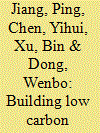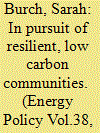| Srl | Item |
| 1 |
ID:
124472


|
|
|
|
|
| Publication |
2013.
|
| Summary/Abstract |
Low carbon sustainability has been addressed in China's national development strategies. This research explores individual behaviour change and engagement in building low carbon communities in China through a case study looking at the building of a low carbon campus at Fudan University, Shanghai. Individual behaviour directly influences the overall energy consumption and carbon emissions on Fudan University's campus. Even though relevant polices have been issued for energy conservation, the energy consumption increased by 5% every year, which suggests that the "top-down" approach telling students and staff "what to do" does not work effectively. Based on a comprehensive method which includes the individual and social aspects related to the energy behaviour, the research analyses the promotion of individual engagement in building a low carbon campus through behaviour change based on four main aspects: (1) awareness raising and behaviour forming; (2) approaches to encourage behaviour change; (3) beyond the barriers and the constraints; and (4) systems and mechanisms for the long-term engagement. A low carbon management system is proposed for not only addressing management and technical solutions at the university level, but also based on the contributions from behaviour changes in establishing a low carbon campus at Fudan University at the individual level.
|
|
|
|
|
|
|
|
|
|
|
|
|
|
|
|
| 2 |
ID:
101447


|
|
|
|
|
| Publication |
2010.
|
| Summary/Abstract |
This article presents the findings of a study that examined three municipalities in the Lower Mainland of British Columbia, Canada, in order to determine the nature of the socio-cultural and institutional barriers to action on climate change at the local level. The central goals of this paper are: (1) to propose a simple typology of institutional and socio-cultural barriers to action by gathering insights from an inter-disciplinary set of literatures; (2) to explore the ways that these barriers influence the utilization of various forms of capacity to achieve greenhouse gas reduction and resiliency in three case study communities; and (3) to understand the dynamic interactions amongst, and relative importance of, these barriers at the local level. The evidence presented in this paper indicates that barriers are deeply interwoven phenomena, which may reinforce one another and create substantial inertia behind unsustainable patterns of municipal operations. Nevertheless, the same factors that can inhibit action on climate change (such as an organizational culture of combativeness or mutual disrespect) can also facilitate it (as with a culture of collaboration or innovation). This article suggests that a deeper understanding of the ways in which barriers can be transformed into enablers of action is a critical next step in the evolution climate change policy design and implementation at the local level.
|
|
|
|
|
|
|
|
|
|
|
|
|
|
|
|